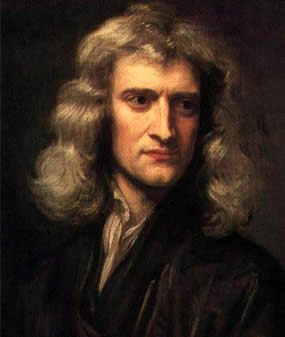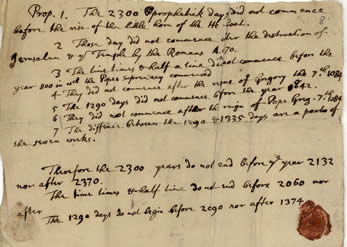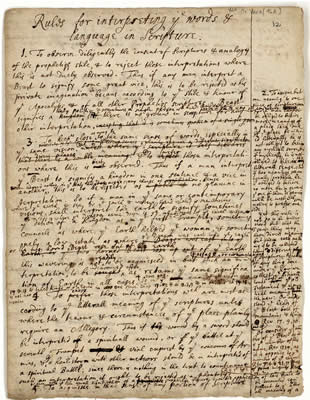End of World in 2060 ? – Newton’s prediction
 Sir Isaac Newton, one of the most influential scientists of all time
Sir Isaac Newton, one of the most influential scientists of all time
Sir Isaac Newton didn't just spend his time figuring out how gravity and laying the scientific foundations for how we conceive of the physical world to this day. He also applied mathematical logic to the Bible in order to construct elaborate prophesies about the end of the world. His calculations led him to believe that the world would end 1,260 years after the foundation of the Holy Roman Empire. The apocalypse couldn't occur before 2060, he believed, though he remained hesitant to confirm any single expiration date.
The two documents detailing this prediction are currently housed within the Jewish National and University Library in Jerusalem. Both were believed to be written toward the end of Newton's life, around 1705. These documents do not appear to have been written with the intention of publication and Newton expressed a strong personal dislike for individuals who provided specific dates for the Apocalypse (a disclosure of something hidden) purely for sensational value. Furthermore, he at no time provides a specific date for the end of the world in either of these documents.
The logic of Newton's apocalyptic calculations
To understand the reasoning behind the 2060 prediction, an understanding of Newton's theological beliefs should be taken into account, particularly those negative views he held about the Papacy (supremacy of Pope). Both of these lay essential to his calculations, which are themselves based upon specific chronological dates which he believed had already transpired and had been prophesied within Revelation and Daniel, books within the Christian Bible.
Newton, like many historicist prophetic commentators of his age, believed that the prophetic time periods 1260, 1290, 1335 and 2300 days actually represent 1260, 1290, 1335 and 2300 years using the "day-for-a-year principle".
-
The time period 1260 days appears in Daniel 7:25 (as "a time and times and the dividing of time" [=a year, two years and a half year]), Daniel 12:7 (as "a time, times, and an half" [=a year, two years and a half year]), Revelation 11:3 (1260 days), Revelation 12:6 (1260 days) and Revelation 13:5 (42 months) in Bible.
- The time period 1290 days appears in Daniel 12:11. The time period 1335 days appears in Daniel 12:12. The time period 2300 days occurs in Daniel 8:14.
How did Newton arrive at the date 2060?
For Newton the above time periods (especially the 1260 years) represent the time span of the apostasy of the Church (a perceived fallen state of traditional Christianity, especially the Roman Catholic Church). Thus, he looked in history for the likely date when the apostasy formally began (one sign of this for him was the date when the Papal Church obtained temporal power and the foundation of Holy Roman Empire. From there it was a simple matter of adding the time period to the beginning date. Finding the commencement date was of great importance to Newton, since once he added the prophetic time periods to this date, he was able to determine the end of the world were going to occur.
Newton considered several commencement dates. Newton twice gives 800 A.D. for the beginning of "the Pope's supremacy". The year 800 is a significant one in history, as it is the year Charlemagne (the first Holy Roman Emperor) was crowned emperor of Rome in the west by Pope Leo III at St. Peter's in Rome.
Since Newton believed that the 1260 years corresponded to the duration of the corruption of the Church, he added 1260 to 800 A.D. and arrived at the date 2060 for the "fall of Babylon" or cessation (end) of the apostate Church.
It seems that Newton believed the fall could perhaps begin somewhat before the end of the 1260-year period and continue for a short time afterward. Whatever the precise chronology, Newton believed that sometime shortly after the fall of the corrupt Church, Christ would return and set up a 1000-year Kingdom of God on earth. Newton cited Daniel 7:26-27 as evidence of this:
But the judgment shall sit, and they shall take away his dominion to consume and to destroy it unto the end. And the kingdom and dominion (authority, control & power), and the greatness of the kingdom under the whole heaven, shall be given to the people of the saints of the most High, whose kingdom is an everlasting kingdom, and all dominions shall serve and obey him.
Two documents detailing this prediction of the date 2060
 Newton's manuscript containing the prediction of end on world in 2060
Newton's manuscript containing the prediction of end on world in 2060
The first document, is a small letter slip, on the back of which is written haphazardly in Newton's hand. The manuscript fragment contains a number of interesting features, including the remnants of the red wax seal and a series of mathematical calculations.
Prop. 1. The 2300 prophetick days did not commence before the rise of the little horn of the He Goat.
2. Those day [sic] did not commence a[f]ter the destruction of Jerusalem & ye Temple by the Romans A.[D.] 70.
3. The time times & half a time did not commence before the year 800 in wch the Popes supremacy commenced
4 .They did not commence after the re[ig]ne of Gregory the 7th. 1084
5. The 1290 days did not commence b[e]fore the year 842.
6. They did not commence after the reigne of Pope Greg. 7th. 1084
7 .The diffence [sic] between the 1290 & 1335 days are a parts of the seven weeks.
Therefore the 2300 years do not end before ye year 2132 nor after 2370.
The time times & half time do n[o]t end before 2060 nor after [2344]
The 1290 days do not begin [this should read: end] before 2090 [Newton might mean: 2132] nor after 1374 [sic; Newton probably means 2374]
In the second reference to the 2060 prediction, Newton writes:
 Newton's manuscript: Rules for interpreting words & language in Scriptures
Newton's manuscript: Rules for interpreting words & language in Scriptures
So then the time times & half a time are 42 months or 1260 days or three years & an half, recconing twelve months to a yeare & 30 days to a month as was done in the Calendar of the primitive year. And the days of short lived Beasts being put for the years of lived [sic] kingdoms, the period of 1260 days, if dated from the complete conquest of the three kings A.C. 800, will end A.C. 2060. It may end later, but I see no reason for its ending sooner. This I mention not to assert when the time of the end shall be, but to put a stop to the rash conjectures of fancifull men who are frequently predicting the time of the end, & by doing so bring the sacred prophesies into discredit as often as their predictions fail. Christ comes as a thief in the night, & it is not for us to know the times & seasons wch God hath put into his own breast.
Clearly Newton's mathematical prediction of the end of the world is one derived from his interpretation of not only scripture, but also one based upon his theological viewpoint regarding specific chronological dates and events as he saw them.
Did Newton believe the world would end in 2060?
For Newton, 2060 A.D. would be more like a new beginning. It would be the end of an old age, and the beginning of a new era—the era Jews refer to the Messianic age and the era premillenarian Christians term the Millennium or Kingdom of God. Although Newton believed there would be wars and cataclysms around the time of the end, for him this period was also the storm before the calm. Newton's prophetic faith therefore has a positive element.
In a separate manuscript, Isaac Newton interprets Revelation 21 and 22 and relates the post 2060 events by writing:
“A new heaven & new earth. New Jerusalem comes down from heaven prepared as a Bride adorned for her husband. The marriage supper. God dwells with men wipes away all tears from their eyes, gives them of ye fountain of living water & creates all thin things new saying, It is done. The glory & felicity of the New Jerusalem is represented by a building of Gold & Gems enlightened by the glory of God & ye Lamb & watered by ye river of Paradise on ye banks of which grows the tree of life. Into this city the kings of the earth do bring their glory & that of the nations & the saints reign for ever & ever.”
Isaac Newton dragged Roman Catholic Church while calculating the end of world date
Newton was a "scientist" and a "natural philosopher". Natural philosophy included not only the study of nature, but also the study of God's hand at work in nature. It is also clear from his private manuscripts that Newton believed the ideal natural philosopher would also be a priest of nature. For Newton, there was no impermeable barrier between religion and what we now call science. Throughout his long life, Newton laboured to discover God's truth - whether in Nature or Scripture. Although he recognized disciplinary distinctions, Newton believed that truth was one. Thus, Newton's study of Nature and Scripture were in a certain sense two halves of a whole: the discovery of the mind of God.
For Newton the 1260 years ("a time and times and the dividing of time" as in Bible) represent the time span of the apostasy of the Church (a perceived fallen state of traditional Christianity, especially the Roman Catholic Church). His calculations led him to believe that the world would end and begin a new era 1260 years from a particular year. He looked in history for the likely commencement date. Newton arrived at AD 800 as the beginning of "the Pope's supremacy" and the first Holy Roman Emperor was crowned. Thus he predicted year 2060 as end of world and to begin a new era.
What message Isaac Newton would have meant to convey from this curious prediction?
Edited by: Davidson Karakkad || Source:www.isaac-newton.org || wikipedia.org. || Please mail your valuable comments about this article and other contents in this website to:
datatorch@gmail.com. Also please suggest interesting life stories to include in this website